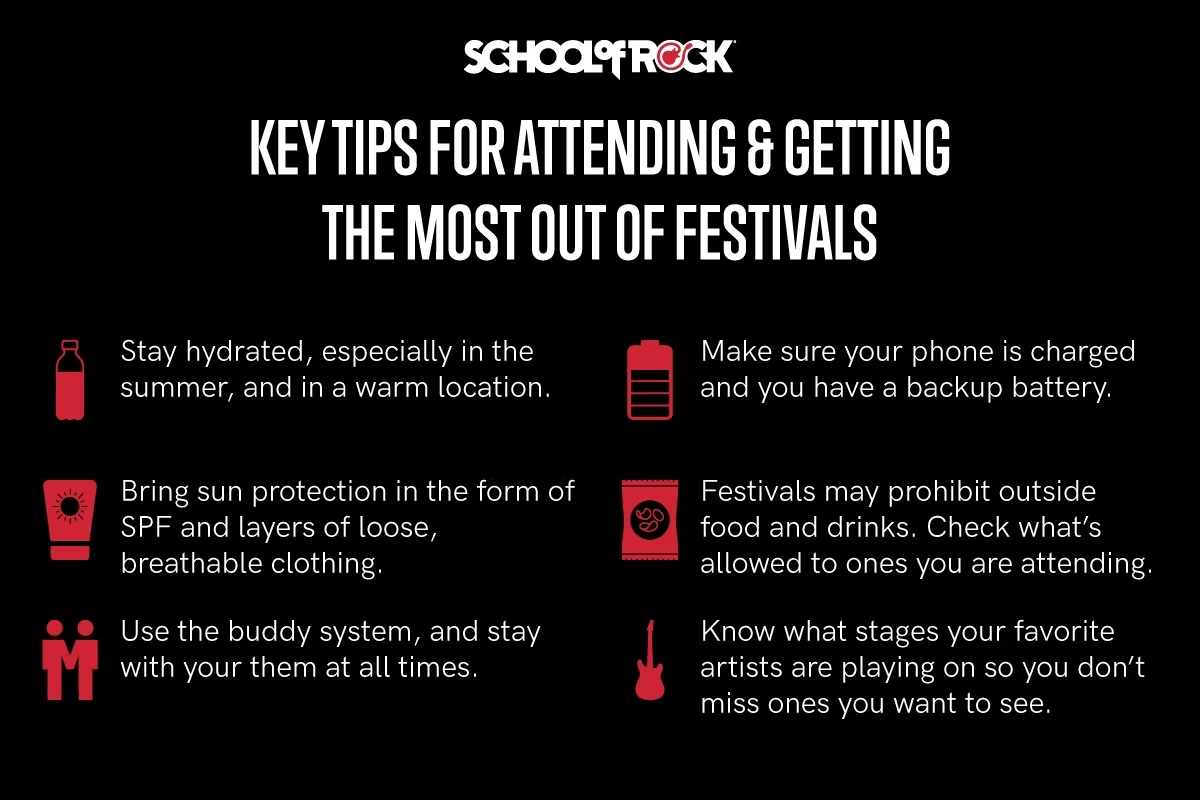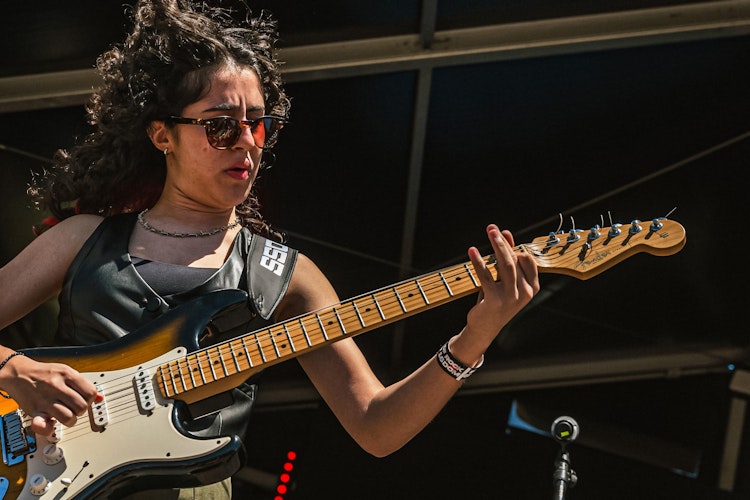The rhythmic beats and soulful melodies of Latin Rock music have been weaving a rich tapestry of cultural fusion for decades. As we celebrate Hispanic Heritage Month, one remarkable way to immerse ourselves in this diverse musical heritage is by attending Latin Rock Festivals. From the origins of Latin Rock to the vibrant atmosphere of these festivals, each note resonates with the essence of Latin American culture.
The Origins of Latin Rock Music
Latin Rock in the US emerged as a harmonious blend of rock & roll and folk Latin genres. Key figures like Carlos Santana pioneered the movement, infusing psychedelic jazz, salsa, and Mexican folk into the rock and roll landscape. School of Rock's guitar lessons help students master the iconic sounds of Latin Rock, from Santana's soaring solos to the rhythmic strumming of traditional Latin American music. Other US Latino groups emerged in the late ’60s and early ’70s including Malo, Ocho, Mandrill, El Chicano, and War. Across Latin America, local rock scenes flourished, fusing local musical traditions with the international sound of rock & roll. Peru had bands like Telegraph Avenue, Traffic Sound, the Mad's, El Polen and Black Sugar; Colombia produced Siglo Cero, Génesis, and La Columna de Fuego; in Argentina Arco Iris, Carlos Luis Spinetta, and Soda Stereo created a vibrant rock scene; in Cuba, groups like Síntesis fused Afro-Cuban religious music with rock; in Brazil, Jorge Ben and Os Mutantes developed samba rock.

The Importance of Latin Rock Festivals
Live music is an immersive experience, and music festivals offer a unique platform to enjoy the music you love and discover music new to you. School of Rock's Rock 101 program provides students with the skills and confidence to take the stage and celebrate Latin Rock's rich cultural heritage. Beyond the electrifying performances, these festivals provide a glimpse into each artist's diverse influences, reflecting a mix of cultures from across Latin America and the Caribbean.
At the Celebrate Brooklyn showcase in August 2023, I discovered new-to-me singer-songwriter Sara Curruchich, who seamlessly blends Spanish with her indigenous language, Kaqchikel. Her music, ranging from powerful guitar riffs to chest-forward vocals, vividly captures the essence of indigenous women's experiences. Witnessing these women, adorned in beautiful embroidery, rocking the stage serves as a poignant reminder of the universal appeal of rock music. The festival experience offers a unique chance to explore the diverse influences impacting beloved artists and integrate these lessons into your own musical journey.

The Best Latin Rock Festivals in the United States
The atmosphere at Latin Music Festivals is unparalleled, showcasing the diversity of Hispanic culture. It's a melting pot of genres, from hard-hitting, uptempo reggaeton to chill electronic beats and alternative Latin acts. The festivals become a celebration of the rich cultural heritage embedded in Latin American music.
- Vibra Urbana, Miami, FL (Feb. 17-18): Celebrating urbano music, reggaeton, and hip-hop, this festival is a dance extravaganza in the Latino capital.
- Besame Mucho, Austin, TX (March 2): A festival featuring renowned artists like Los Tigres del Norte, Café Tacvba, Gloria Trevi, and Juanes.
- Baila Conmigo, Miami, FL (March 30): A nostalgic journey featuring old-school merengue with artists like Sergio Vargas and Eddy Herrera.
- Shaky Knees, Atlanta, GA (May 3-5): A diverse lineup including alternative Latin acts amidst rock giants like Interpol and Foo Fighters.
- Unidos en la Música, St. Augustine, FL (May 4, 2024): A family-friendly celebration showcasing a diverse range of Latin music.
- Sueños, Chicago, IN (May 27-28): An upcoming lineup promises hard-hitting, high-energy reggaeton performances.
- La Onda, Napa Valley, CA (June 1-2): Featuring Latin Rock legends like Maná, this festival is a testament to the genre's enduring influence.
- Latin Alternative Music Conference, NYC (July 9-13): Geared toward industry insiders, this conference unveils up-and-coming Latin rock, hip-hop, and electronic acts.

Key Tips for Attending and Getting the Most out of Each Festival
- Before attending the festival, young musicians can prepare with School of Rock's Little Wing program, setting them up for an unforgettable first-time experience.
- Stay hydrated, especially in the summer and in a warm location.
- Bring sun protection in the form of SPF and layers of loose, breathable clothing. Sun protection is important even if you have darker skin, and not, as your abuela would tell you ‘para que no te pongas más morena’ (ew, internalized racism), but because sun damage can have long term health consequences.
- Use the buddy system, and stay with your buddy at all times.
- Make sure your phone is charged and you have a backup battery pack.
- Many festivals prohibit outside food and beverage. Check what is permitted to any festival you plan to attend.
- Plan in advance what stages your favorite artists are playing on so you don’t miss anyone you really want to see.
- But also be open to finding your new favorite artist in between the headliners.
The Impact of Latin Rock Music on Contemporary Culture
Latin Rock is a cultural bridge that extends beyond Latin artists. Influencing artists like David Byrne and Stan Getz, Latin rhythms have left an indelible mark on global music. The incorporation of clave, a backbone of Afro-Cuban and Afro-Brazilian music, into the influential Bo Diddley beat is a testament to this fusion. School of Rock's songwriting program empowers students to create their own Latin-inspired music, further contributing to the evolution of Latin Rock music.
Contemporary Latin music, as showcased in these festivals, spans various strands, from rock to pop, hip-hop, electronic, R&B, and more. The symbiosis of Latin and Rock has birthed a vibrant musical landscape where artists from different backgrounds collaborate, creating a diverse and inclusive music culture.
As we look ahead, the future of Latin Rock resides in the hands of passionate musicians. Programs like School of Rock's music camps nurture this passion, empowering students to play fearlessly, drawing inspiration from their communities and cultural heritage. Whether you're a non-Latino drawing inspiration from diverse sounds or a Latinx musician celebrating your cultural roots, the key lies in creating music with joy and authenticity. School of Rock encourages students to play fearlessly, drawing inspiration from their communities and weaving the threads of cultural diversity into their music.
Join in Embracing and Celebrating Diversity During a Latin Rock Festival
Latin Rock Festivals offer more than just a musical experience; they are celebrations of diversity, cultural heritage, and the unity of different musical genres. As we immerse ourselves in these festivals, we not only celebrate Hispanic Heritage Month but also contribute to the vibrant tapestry of contemporary music. So, let the music play, let the rhythms intertwine, and let us embrace the harmonious fusion of Latin Rock.
ABOUT THE AUTHOR
Amalia Gelpi is an instructor at the School of Rock in Somerville, NJ with experience as a vocalist and keyboardist.



